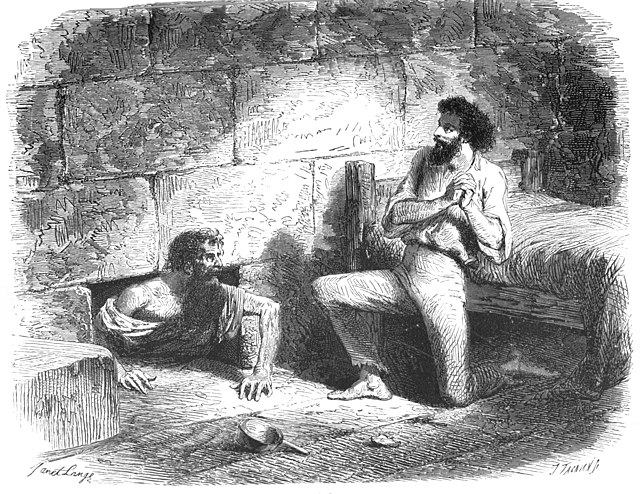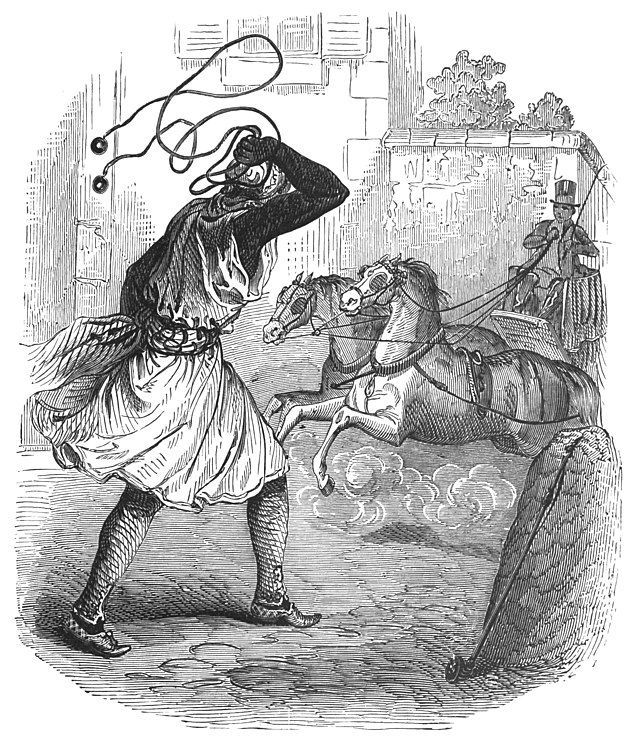 How Far Would You Go for the Perfect Revenge?
How Far Would You Go for the Perfect Revenge?
Author: Alexandre Dumas
At 19 Edmond Dantes has everything he could ever want: a devoted fiancé, an impending wedding, a loving and self-sacrificing father, and soon the job of captain. He is doing well. Too well. His shipmate is vengeful, his downstairs neighbor weak and jealous, his soon-to-be-wife’s thwarted admirer desolate and angry. And so, Dantes’ good fortune becomes a curse. Through conniving and circumstance, his enemies see to his arrest on the day that would be his wedding. Fourteen-years later, the man who escapes prison is not the same naïve and trusting person. He now has a mission. Call it justice, call it revenge, call it the ruin of his soul.
The Count of Monte Cristo is an epic weighing in at well over 1,000 pages. It’s the classic revenge story – a good hearted man transforming into an avenging angel, stepping into the role of God and taking things way too far. It is a book that examines the heart, following Dantes but also his regretful fiancé, the ill-fated Mercedes who, through no fault of her own, marries one of the men who ruined Dantes’ life.
 In The Count of Monte Cristo the dangers and joys of meeting out judgment come into play through devious schemes, some literarily decades in the making. Dantes meets a man in prison one night when attempting to secretly tunnel out of his cell, and this man (a priest) teaches him much. This man also makes Dantes’ fortune and, through a weird and morbid twist of fate, ensures Dantes’ near fatal escape. Armed now with wealth and education, Dantes is a self-styled Count by day, but he plays many roles, dons many costumes, and lurks in the background of the lives of those who did him good and those who did him evil. Dantes has learned patience and with it he slowly carves away the foundations of his enemies’ lives, watching the bodies pile up, one after another.
In The Count of Monte Cristo the dangers and joys of meeting out judgment come into play through devious schemes, some literarily decades in the making. Dantes meets a man in prison one night when attempting to secretly tunnel out of his cell, and this man (a priest) teaches him much. This man also makes Dantes’ fortune and, through a weird and morbid twist of fate, ensures Dantes’ near fatal escape. Armed now with wealth and education, Dantes is a self-styled Count by day, but he plays many roles, dons many costumes, and lurks in the background of the lives of those who did him good and those who did him evil. Dantes has learned patience and with it he slowly carves away the foundations of his enemies’ lives, watching the bodies pile up, one after another.
The narrative starts out fast but once Dantes makes his daring escape, everything slows down. Sometimes our hero turned pseudo-villain is absent from the story entirely, lucking in the shadows as we follow the lives and even the children’s lives of the people he intends to destroy. Dantes is not out for blood so much as complete destruction – a revenge that shatters the mind and soul without touching the body. It’s far more intense, but requires patience from the reader and time for set-up. The characterization is deep, the schemes coming in bits and pieces.
What’s interesting is that in the beginning, we have full empathy with our ill-treated hero, but as wealth and malice build in him the reader’s emotions waver. This is part of the brilliance of the story and the way it portrays real revenge, especially a strike that is so well thought out and planned. Dantes at times shows goodness, even mercy, and at other times he is haughty and cruel. Sometimes we are on board with his revenge – his enemies do rather deserve it – but the collateral damage makes us pause. This isn’t the kind of story where you can sit back and enjoy the unfolding chaos. It makes you think, asking questions, and about the time you determine that either yes, Dantes is right or no, Dantes has gone too far, something shifts again and the reader is left unbalanced, questioning, disoriented. It’s brilliant and powerful.
 The book is old, though, and there are some things, not surprisingly, that are simply horrifying. Dantes effectively owns two slaves. One is a male slave who is constantly put in danger, with Dantes bragging that the man will die for him, at his command (in front of the poor man!) After all Dantes went through in the prison, it’s shocking to see that he has learned nothing and has no sympathy for the human condition of abasement by circumstance and others. It was hard for me to get beyond this callousness and at times this portrayal made me hate the very character with whom I was supposed to empathize.
The book is old, though, and there are some things, not surprisingly, that are simply horrifying. Dantes effectively owns two slaves. One is a male slave who is constantly put in danger, with Dantes bragging that the man will die for him, at his command (in front of the poor man!) After all Dantes went through in the prison, it’s shocking to see that he has learned nothing and has no sympathy for the human condition of abasement by circumstance and others. It was hard for me to get beyond this callousness and at times this portrayal made me hate the very character with whom I was supposed to empathize.
The other slave – a woman – has a more complicated story. I can’t say as much about this one, since it would spoil some major elements of the conclusion. Suffice it to say that some of the talk here, beyond the issue of slavery, is also derogatory to women and leaves readers further enraged by Dantes, who after everything he went through should know better.
In the conclusion, we don’t get a pretty answer. Of course, that’s where the tale truly strikes home. Is Dantes a hero or a fiend? Did he do right, did he act as God’s hand, or did he, like the men he despises, fall into the same role of villainy? What is evident is that Dantes’ revenge was hardly a salve and that the happiness he had in the beginning is something that can never be gotten again, not with money, not with love, and maybe not even with time.
– Frances Carden
Follow my reviews on Twitter at: https://twitter.com/xombie_mistress
Follow my reviews on Facebook at: https://www.facebook.com/FrancesReviews
- Book Vs Movie: The Shining - April 6, 2020
- Thankful For Great Cozy Mysteries - December 13, 2019
- Cozy Mysteries for a Perfect Fall - October 20, 2019


